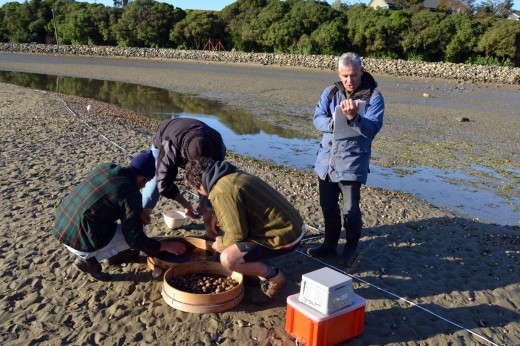What is a Stock Assessment?
A stock assessment monitors a variety of indicators for the health of a fishery. Such indicators include how many of each species is present; and the age, size, growth rate, and reproductive performance of the present species.
These indicators, which reflect the current fishing pressure and health of the environment, can help AMT managers set sensible bylaws and manage responsibly. Trends of stock assessment indicators are just as important as the value itself.

Photo by Derek Richards. Cockle survey, Karitane.
Regular stock assessment is called ‘ecological monitoring’. Careful regulation, based on this ecological monitoring, is called “adaptive management” or “learning-by-doing.” This same basic principle led to the development of a strong Mātauranga Māori to guide sustainable harvesting by one’s own tūpuna. Regular monitoring and ‘learning-by-doing’ will likely be the main approaches used by Tangata Whenua to manage their fisheries in the future. These methods are inexpensive and sometimes can be done by the Tangata Tiaki themselves.
Discussions with hapū and rūnanga groups that have joined TMK have underscored a widespread need for regular stock assessments, especially baseline surveys where mātaitai, taiāpure, and temporary closures are set up.
It is important to note that stock assessments, ecological monitoring, and adaptive management are different than “research,” though they sometimes overlap. Research is often used to determine why a given bylaw is not working, or how it could be improved. It can also help identify threats and solutions to more complex problems. Research is so slow and expensive, so TMK tries to be selective about where it directs its researchers to investigate.
The first MSI contract that kick-started Te Tiaki Mahinga Kai placed a lot of emphasis on searching for improved monitoring methods that the Tangata Whenua can apply as a community. It allowed us to concentrate on tool development and community values, before exploring the larger ecological issues. The development of the Marine Cultural Health Index is a splendid example of this type of research.
Tātai kōrero ka ngaro, tātai kōrero ka rangona.
